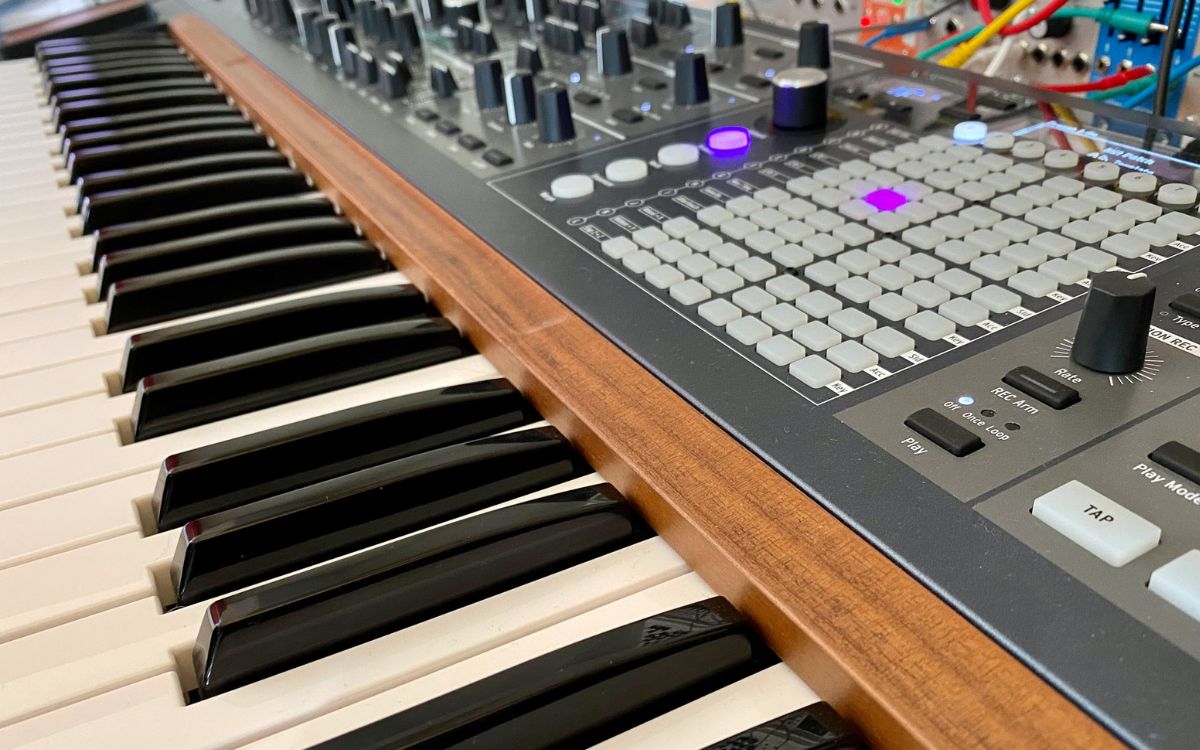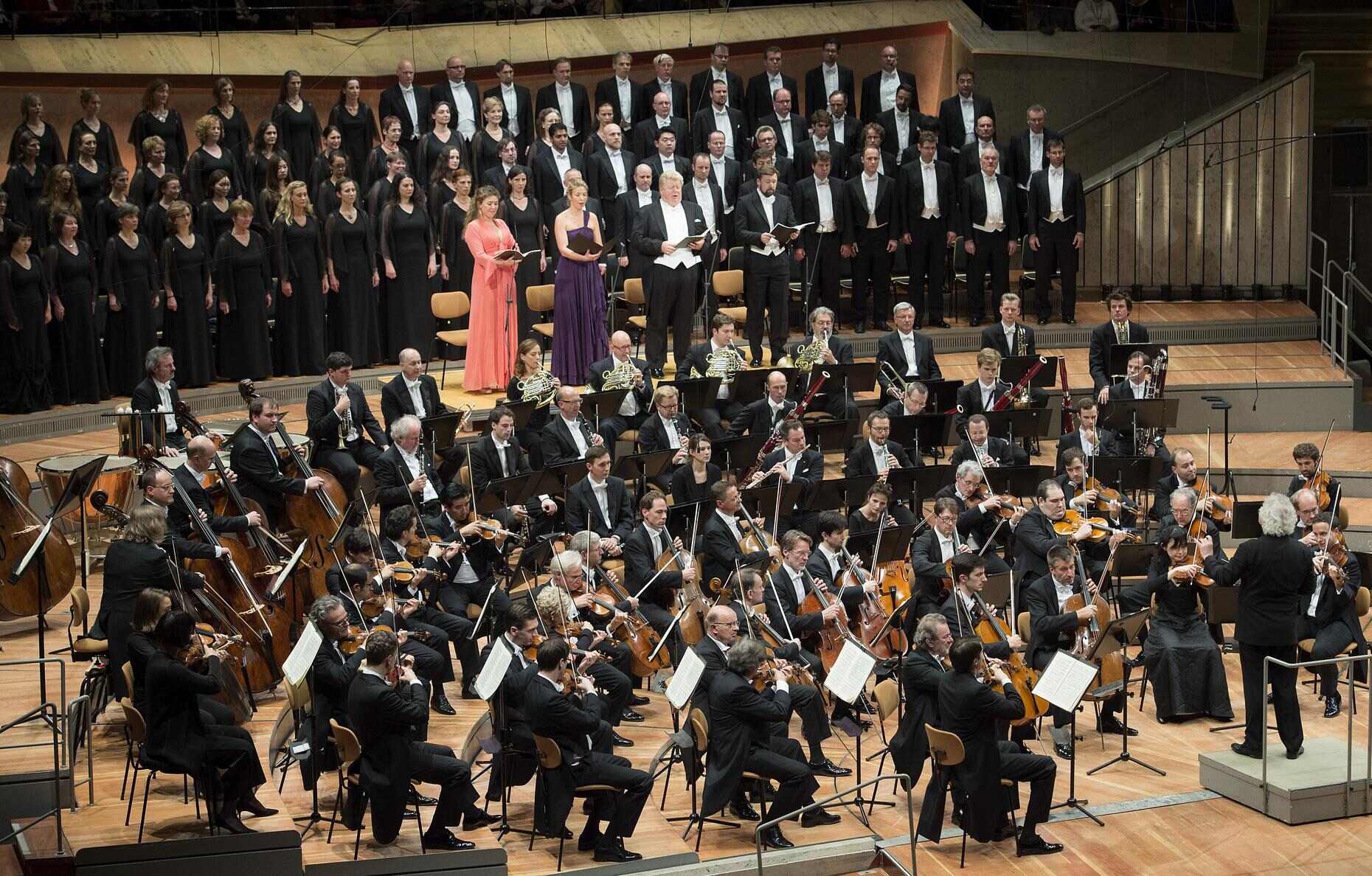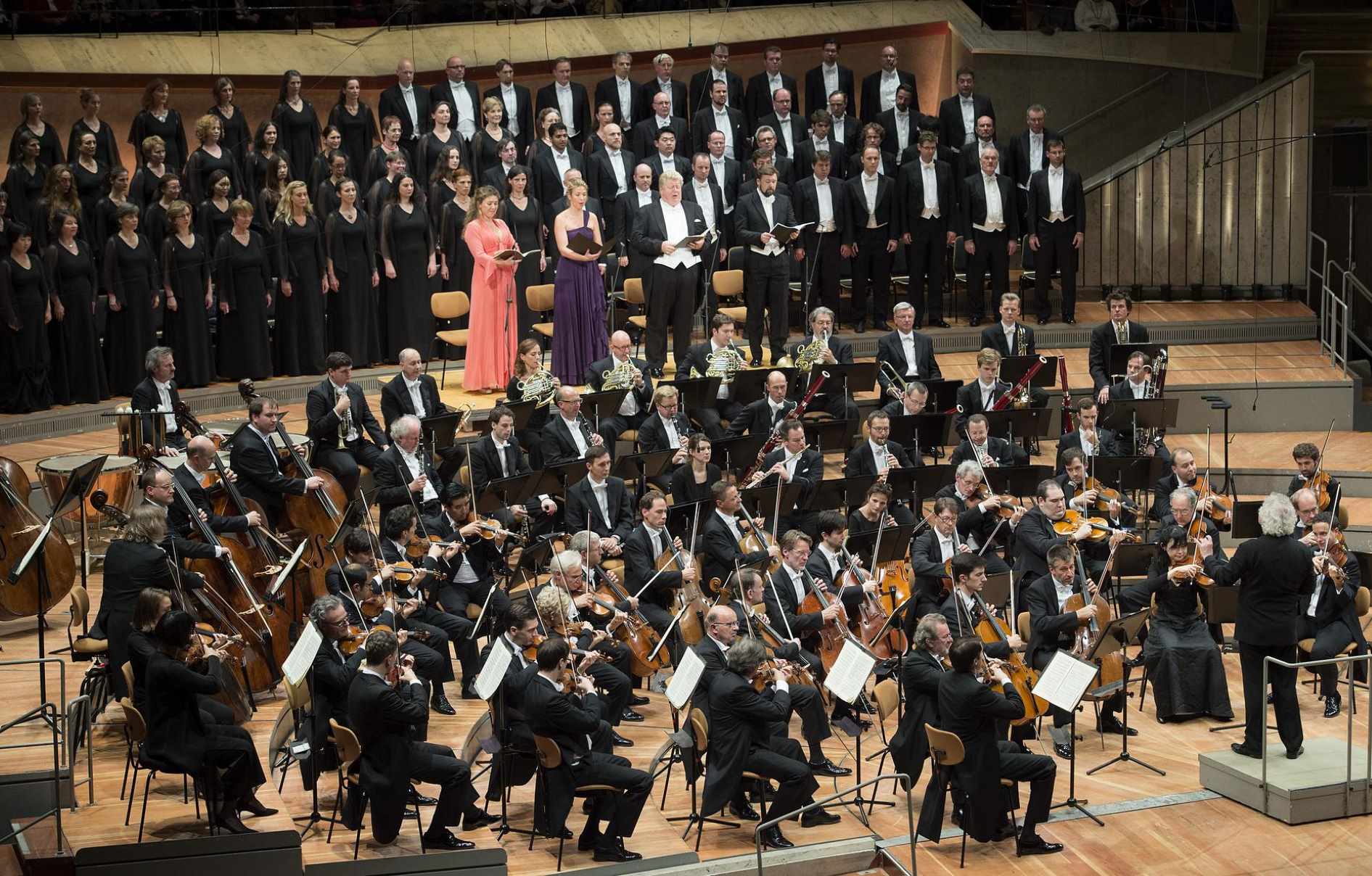Home>Production & Technology>Producer>What Is The Difference Between A Music Producer And A Composer


Producer
What Is The Difference Between A Music Producer And A Composer
Published: March 6, 2024
Discover the key disparities between a music producer and a composer. Uncover their unique roles and contributions to the music industry. Explore more about the differences now!
(Many of the links in this article redirect to a specific reviewed product. Your purchase of these products through affiliate links helps to generate commission for AudioLover.com, at no extra cost. Learn more)
Table of Contents
Introduction
The world of music is a rich tapestry woven from the talents and expertise of various professionals, each contributing their unique skills to create captivating compositions. Among these experts are music producers and composers, two pivotal roles in the music industry. While their titles may seem interchangeable to the uninitiated, a closer look reveals distinct differences in their responsibilities, skills, and creative contributions.
In this article, we will delve into the contrasting realms of music production and composition, shedding light on the defining characteristics of each role. By understanding the nuances that set these positions apart, we gain a deeper appreciation for the intricacies of music creation and the collaborative efforts that bring melodic masterpieces to life.
Let's embark on a journey to unravel the mysteries of music production and composition, exploring the artistry, technical prowess, and creative vision that distinguish music producers from composers. As we navigate through the intricacies of these roles, we will gain insight into the multifaceted nature of the music industry and the harmonious synergy between these two essential pillars of musical creation.
Definition of a Music Producer
A music producer is a multifaceted professional responsible for overseeing the entire process of creating a musical recording. Beyond simply operating the recording equipment, a music producer plays a pivotal role in shaping the artistic direction and sonic quality of a song or album. This involves collaborating closely with artists to actualize their creative vision while leveraging technical expertise to achieve the desired sound.
At the core of their responsibilities, music producers are entrusted with translating the artist's musical concepts into tangible, polished recordings. This demands a keen understanding of musical arrangement, instrumentation, and sound engineering. From selecting the most suitable studio for recording to guiding the arrangement of instruments and vocals, a music producer is the orchestrator of the recording process, ensuring that every element harmonizes seamlessly.
Moreover, a music producer serves as a mentor and collaborator, providing invaluable input to enhance the musical composition. Their role extends beyond the confines of the recording studio, often encompassing aspects of project management and creative direction. Whether it involves refining the song structure, suggesting instrumental arrangements, or offering insightful feedback on vocal performances, the producer's influence permeates every facet of the recording process.
In essence, a music producer is a catalyst for transforming raw musical ideas into polished, marketable recordings. Their expertise in sound engineering, music theory, and artistic direction empowers them to infuse each production with a distinct sonic identity. By seamlessly blending technical proficiency with artistic sensibilities, music producers wield a profound influence on the sonic landscape, shaping the very essence of the music we cherish.
Definition of a Composer
At the heart of every musical creation lies the profound artistry of a composer. A composer is a visionary maestro who crafts original musical works, breathing life into melodies, harmonies, and rhythms that resonate with the human soul. Their role transcends mere songwriting, encompassing the orchestration of symphonies, the composition of film scores, and the creation of evocative musical landscapes that enrapture audiences.
The essence of a composer's craft lies in their ability to harness the boundless realm of musical expression, weaving intricate tapestries of sound that evoke emotions and transcend linguistic barriers. Whether it's a poignant piano sonata, a stirring operatic aria, or a grandiose film score, composers channel their creative energies into crafting musical narratives that transcend the constraints of spoken language.
Central to the composer's role is the act of translating abstract musical ideas into tangible scores that can be interpreted by musicians and brought to life through performance. This demands a profound understanding of musical theory, harmony, and orchestration, allowing composers to deftly manipulate musical elements to evoke specific moods, convey narratives, and stir the depths of human emotion.
Furthermore, composers often collaborate closely with directors, producers, and performers to ensure that their musical compositions align seamlessly with the intended visual or narrative elements. This collaborative synergy underscores the composer's adaptability and versatility, as they adeptly tailor their compositions to complement diverse artistic mediums, be it film, theater, or multimedia productions.
In essence, a composer is a storyteller whose medium is not words, but the ethereal language of music. Their compositions serve as profound conduits of human experience, transcending cultural boundaries to resonate with audiences on a profound emotional level. Through their boundless creativity, technical acumen, and unwavering passion for musical expression, composers imbue the world with timeless melodies that echo through the annals of history.
Responsibilities of a Music Producer
A music producer's role encompasses a diverse array of responsibilities that collectively shape the sonic identity of a recording. At the crux of their duties lies the task of translating the artist's musical vision into a tangible, marketable product. This involves collaborating closely with artists to actualize their creative aspirations while leveraging technical expertise to achieve the desired sound.
One of the primary responsibilities of a music producer is to provide guidance and direction during the recording process. This involves working closely with artists to refine song arrangements, select suitable instrumentation, and ensure that the overall sonic palette aligns with the intended artistic vision. By offering valuable insights and suggestions, producers play a pivotal role in sculpting the musical landscape, guiding artists towards compositions that resonate with audiences.
Furthermore, music producers are entrusted with the critical task of overseeing the technical aspects of recording. This includes selecting the most suitable recording studio, coordinating with sound engineers, and leveraging their expertise in sound engineering to capture pristine audio recordings. Whether it involves optimizing microphone placements, fine-tuning instrument tones, or ensuring optimal sound quality, producers are the custodians of sonic excellence, meticulously crafting recordings that captivate listeners.
In addition to their technical prowess, music producers also serve as mentors and collaborators, nurturing the artistic growth of the artists they work with. This often entails providing constructive feedback on vocal performances, suggesting refinements to song structures, and offering creative input to enhance the overall musical composition. By fostering a supportive and collaborative environment, producers empower artists to unlock their creative potential and elevate their musical expressions to new heights.
Moreover, music producers often assume project management responsibilities, overseeing the logistical aspects of the recording process. This may involve coordinating recording schedules, managing budgets, and liaising with session musicians and other industry professionals. By adeptly navigating the intricacies of project management, producers ensure that the recording process unfolds seamlessly, allowing artists to focus on their creative endeavors without being encumbered by logistical concerns.
In essence, the responsibilities of a music producer are multifaceted and far-reaching, encompassing elements of artistic guidance, technical expertise, mentorship, and project management. By deftly balancing these diverse responsibilities, music producers wield a profound influence on the sonic landscape, shaping the very essence of the music we cherish.
Responsibilities of a Composer
At the heart of the musical realm, composers bear the profound responsibility of crafting original musical works that transcend the boundaries of time and culture. Their role extends far beyond the act of songwriting, delving into the orchestration of symphonies, the composition of film scores, and the creation of evocative musical landscapes that enrapture audiences. The responsibilities of a composer are as diverse as they are profound, encompassing a tapestry of creative, technical, and collaborative endeavors that collectively define their pivotal role in the music industry.
Central to the composer's responsibilities is the art of translating abstract musical ideas into tangible scores that can be interpreted and performed by musicians. This demands a profound understanding of musical theory, harmony, and orchestration, allowing composers to deftly manipulate musical elements to evoke specific moods, convey narratives, and stir the depths of human emotion. Whether it's crafting a poignant piano sonata, a stirring operatic aria, or a grandiose film score, composers channel their creative energies into crafting musical narratives that resonate with audiences on a profound emotional level.
Moreover, composers often collaborate closely with directors, producers, and performers to ensure that their musical compositions align seamlessly with the intended visual or narrative elements. This collaborative synergy underscores the composer's adaptability and versatility, as they adeptly tailor their compositions to complement diverse artistic mediums, be it film, theater, or multimedia productions. By integrating their compositions harmoniously with visual and narrative elements, composers breathe life into the artistic visions of filmmakers, playwrights, and multimedia creators, enriching the sensory experiences of audiences worldwide.
Beyond their creative and collaborative endeavors, composers also bear the responsibility of preserving the integrity of musical traditions while pushing the boundaries of innovation. This delicate balance entails honoring the timeless principles of musical craftsmanship while infusing compositions with fresh, inventive elements that captivate contemporary audiences. By embracing this duality of tradition and innovation, composers serve as custodians of musical heritage, ensuring that the timeless beauty of classical compositions harmonizes with the vibrant creativity of modern musical expressions.
In essence, the responsibilities of a composer are a testament to their profound impact on the musical landscape, transcending mere musical creation to encompass collaborative artistry, cultural preservation, and the timeless resonance of musical narratives. Through their boundless creativity, technical acumen, and unwavering passion for musical expression, composers imbue the world with timeless melodies that echo through the annals of history.
Skills and Qualifications of a Music Producer
A proficient music producer possesses a diverse skill set that seamlessly integrates technical expertise, artistic acumen, and interpersonal prowess. At the core of their skill repertoire lies a profound understanding of sound engineering, encompassing the intricacies of recording equipment, signal processing, and audio manipulation. This technical proficiency empowers producers to sculpt pristine sonic landscapes, leveraging their mastery of recording technologies to capture and enhance the musical performances of artists.
In addition to technical prowess, music producers exhibit an acute ear for musical nuances, enabling them to discern subtle tonal variations, harmonies, and rhythmic cadences. This keen sense of musical perception allows producers to offer insightful feedback on vocal performances, instrumental arrangements, and overall sonic coherence, guiding artists towards compositions that resonate with audiences.
Moreover, effective communication and collaboration are essential qualities that distinguish exceptional music producers. The ability to cultivate a supportive and creative environment, foster open dialogue with artists, and collaborate seamlessly with sound engineers and session musicians is paramount. By nurturing a harmonious synergy within the recording environment, producers facilitate a conducive space for artists to explore their creative potential and actualize their musical visions.
Furthermore, adaptability and versatility are hallmark traits of successful music producers. Whether it involves navigating diverse musical genres, embracing evolving recording technologies, or accommodating the unique creative sensibilities of artists, producers adeptly tailor their approach to suit the dynamic landscape of music production. This adaptability enables them to traverse the ever-changing currents of the music industry, continually innovating and refining their craft to meet the demands of the contemporary musical landscape.
In terms of qualifications, a formal education in music production, sound engineering, or a related field can provide a solid foundation for aspiring music producers. Additionally, hands-on experience in recording studios, internships with established producers, and a comprehensive understanding of industry-standard recording software and hardware are invaluable assets. Ultimately, a successful music producer embodies a harmonious fusion of technical proficiency, artistic insight, and collaborative spirit, illuminating the path towards sonic excellence and creative innovation.
Skills and Qualifications of a Composer
The role of a composer demands a multifaceted skill set that encompasses artistic prowess, technical acumen, and a profound understanding of musical theory. At the core of a composer's skill repertoire lies an innate ability to harness the boundless realm of musical expression, weaving intricate tapestries of sound that evoke emotions and transcend linguistic barriers. This creative acumen empowers composers to craft original musical works that resonate with audiences on a profound emotional level, transcending cultural boundaries and leaving an indelible mark on the musical landscape.
A deep understanding of musical theory and harmony is fundamental to a composer's craft. Mastery of musical elements such as melody, harmony, rhythm, and form enables composers to deftly manipulate these components to evoke specific moods, convey narratives, and stir the depths of human emotion. This profound understanding of musical theory serves as the cornerstone of a composer's creative endeavors, allowing them to sculpt compositions that resonate with timeless beauty and emotional depth.
Moreover, composers exhibit an acute sense of orchestration and instrumentation, enabling them to breathe life into their musical creations through the interplay of diverse instruments and sonic textures. Whether it's the grandeur of a symphonic orchestra, the intimacy of a chamber ensemble, or the evocative fusion of electronic and acoustic elements, composers adeptly navigate the sonic palette to realize their artistic visions. This orchestration prowess allows composers to imbue their compositions with rich, evocative textures that elevate the emotional resonance of their musical narratives.
Effective communication and collaboration are essential qualities that distinguish exceptional composers. The ability to articulate musical concepts, collaborate seamlessly with performers, and convey artistic intentions with clarity is paramount. Composers often work closely with conductors, musicians, and music directors, necessitating clear and concise communication to ensure that their musical visions are brought to life with precision and authenticity.
In terms of qualifications, a formal education in music composition, music theory, or a related field can provide a solid foundation for aspiring composers. Additionally, hands-on experience in composing original works, studying the masterpieces of renowned composers, and immersing oneself in diverse musical genres are invaluable assets. Ultimately, a successful composer embodies a harmonious fusion of artistic insight, technical proficiency, and collaborative spirit, illuminating the path towards musical innovation and emotional resonance.
Collaboration between Music Producers and Composers
The collaboration between music producers and composers represents a harmonious convergence of artistic vision, technical expertise, and creative synergy. This collaborative partnership transcends the traditional boundaries of music production and composition, forging a dynamic alliance that enriches the sonic landscape with unparalleled depth and innovation.
At the intersection of these two distinct realms lies a fertile ground for artistic exploration and sonic innovation. Music producers, with their keen understanding of sound engineering, artistic direction, and market trends, bring a wealth of technical acumen and industry insight to the table. On the other hand, composers infuse the collaboration with their boundless creativity, orchestration prowess, and profound understanding of musical theory. This complementary fusion of skills and perspectives forms the cornerstone of a collaborative dynamic that elevates musical compositions to new heights of excellence.
The collaboration often begins with a shared artistic vision, where composers and producers embark on a creative journey to conceptualize and actualize a musical work. This initial phase involves in-depth discussions, brainstorming sessions, and the exchange of creative ideas, laying the groundwork for the composition and production process. Composers articulate their musical concepts, thematic elements, and emotional narratives, providing producers with a vivid blueprint from which to shape the sonic identity of the composition.
As the collaboration unfolds, music producers and composers engage in a symbiotic exchange of creative input and technical expertise. Producers offer valuable insights on sound design, arrangement dynamics, and sonic textures, leveraging their expertise to enhance the overall sonic palette of the composition. Meanwhile, composers infuse the collaboration with their artistic sensibilities, guiding the thematic development, orchestration choices, and harmonic nuances that imbue the composition with depth and emotional resonance.
Moreover, the collaborative synergy extends to the recording and production phase, where music producers and composers work in tandem to capture and refine the musical performances. Producers harness their technical prowess to optimize recording techniques, ensure pristine audio quality, and sculpt the sonic nuances that breathe life into the composition. Simultaneously, composers provide artistic guidance, interpretive insights, and orchestral direction, ensuring that the essence of their musical vision is faithfully realized in the recording process.
This harmonious collaboration between music producers and composers culminates in the creation of a musical masterpiece that seamlessly integrates artistic integrity, technical excellence, and emotional depth. The resulting composition embodies the collective genius of both collaborators, resonating with audiences as a testament to the transformative power of collaborative artistry in the realm of music production and composition.
In essence, the collaboration between music producers and composers transcends the sum of its parts, yielding musical compositions that stand as timeless testaments to the profound synergy between technical expertise and artistic innovation. It is within this collaborative crucible that the alchemy of music production and composition flourishes, birthing melodic masterpieces that enrapture the senses and endure as timeless expressions of human creativity.
Conclusion
In the rich tapestry of the music industry, the roles of music producers and composers stand as pillars of creative expression and sonic innovation. As we journeyed through the intricacies of these two distinct realms, we unveiled a profound tapestry of artistry, technical prowess, and collaborative synergy that defines the essence of music production and composition.
Music producers emerged as the maestros of sonic excellence, seamlessly blending technical proficiency with artistic insight to sculpt polished, marketable recordings. Their multifaceted responsibilities encompassed elements of artistic guidance, technical expertise, mentorship, and project management, underscoring the pivotal role they play in shaping the sonic landscape.
On the other hand, composers stood as visionary storytellers, crafting original musical works that transcend cultural boundaries and resonate with audiences on a profound emotional level. Their responsibilities spanned a diverse spectrum of creative, technical, and collaborative endeavors, weaving intricate tapestries of sound that evoke emotions and transcend linguistic barriers.
The collaboration between music producers and composers epitomized the harmonious convergence of artistic vision and technical expertise, yielding musical compositions that stand as timeless testaments to the profound synergy between these two pivotal roles. This collaborative dynamic enriched the sonic landscape with unparalleled depth and innovation, culminating in melodic masterpieces that endure as timeless expressions of human creativity.
As we conclude our exploration of music production and composition, we are reminded of the profound impact these roles wield on the fabric of human experience. Through their boundless creativity, technical acumen, and unwavering passion for musical expression, music producers and composers imbue the world with timeless melodies that echo through the annals of history, transcending cultural boundaries and enriching the human experience with the transformative power of music.
In the symphony of human creativity, music producers and composers stand as luminaries, illuminating the path towards sonic excellence and artistic innovation. Their collaborative endeavors continue to shape the musical landscape, enriching our lives with melodies that resonate with the depths of human emotion, transcending linguistic barriers, and enduring as timeless testaments to the enduring power of collaborative artistry in the realm of music production and composition.











